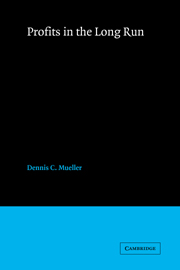Book contents
- Frontmatter
- Contents
- Acknowledgments
- 1 The persistence of firms
- 2 The persistence of profits above the norm
- 3 The persistence of market power
- 4 Profitability and market structure
- 5 The results in perspective
- 6 Profitability and the firm's own advertising, patent activity, risk, and other characteristics
- 7 Profitability and managerial control and compensation
- 8 Mergers and profitability
- 9 Mergers and market share
- 10 The threads gathered and conclusions woven
- Appendix 1 Companies studied
- Appendix 2 Industry categories
- Appendix 3 Industry matchings
- Appendix 4 Assets acquired data (Chapter 7)
- Appendix 5 Mergers and market share: samples of merging companies
- Notes
- References
- Index
9 - Mergers and market share
Published online by Cambridge University Press: 04 May 2010
- Frontmatter
- Contents
- Acknowledgments
- 1 The persistence of firms
- 2 The persistence of profits above the norm
- 3 The persistence of market power
- 4 Profitability and market structure
- 5 The results in perspective
- 6 Profitability and the firm's own advertising, patent activity, risk, and other characteristics
- 7 Profitability and managerial control and compensation
- 8 Mergers and profitability
- 9 Mergers and market share
- 10 The threads gathered and conclusions woven
- Appendix 1 Companies studied
- Appendix 2 Industry categories
- Appendix 3 Industry matchings
- Appendix 4 Assets acquired data (Chapter 7)
- Appendix 5 Mergers and market share: samples of merging companies
- Notes
- References
- Index
Summary
The previous chapter indicates that mergers may not have much of an impact on the profitability of the two merging companies other than through the averaging effect of combining companies with different profit rates. These results, in turn, are consistent with those that find mergers do not have much of a positive effect on either corporate efficiency or market power.
The FTC market share data for 1950 and 1972 allow us to examine another effect of mergers, their effect on market share. We focus specifically on the effects of mergers on the market shares of the acquired companies. We begin by analyzing the expected effects of mergers using the firm approach model of Chapter 4. After discussing the data and methodology, we turn to the empirical results. Conclusions follow.
The effects of changes in efficiency, product quality, and the degree of cooperation on market share
Conglomerate mergers
The number of hypotheses about the causes and effects of conglomerate mergers has grown so much over the years that even a mere listing of all candidates would take an inordinate amount of space (see Steiner 1975; Mueller 1980a, Chapter 2). Considerable time can be saved by grouping existing theories into those implying changes in internal efficiency and those implying changes in market power. We assume that any improvement in efficiency eventually translates into lower costs of production. We depict changes in market power as changes in the degree of cooperation or collusion among the firms in an industry.
- Type
- Chapter
- Information
- Profits in the Long Run , pp. 184 - 208Publisher: Cambridge University PressPrint publication year: 1986

